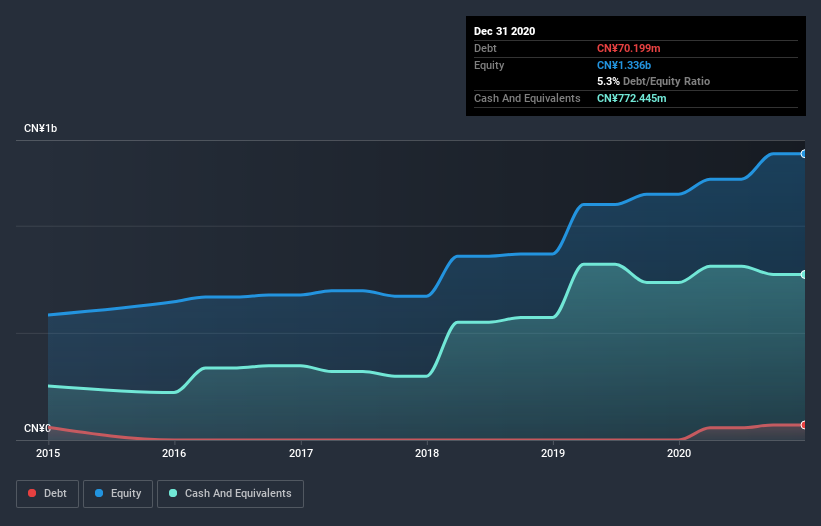Qinqin Foodstuffs Group (Cayman) (HKG:1583) Seems To Use Debt Quite Sensibly

Legendary fund manager Li Lu (who Charlie Munger backed) once said, 'The biggest investment risk is not the volatility of prices, but whether you will suffer a permanent loss of capital.' So it might be obvious that you need to consider debt, when you think about how risky any given stock is, because too much debt can sink a company. As with many other companies Qinqin Foodstuffs Group (Cayman) Company Limited (HKG:1583) makes use of debt. But should shareholders be worried about its use of debt?
What Risk Does Debt Bring?
Generally speaking, debt only becomes a real problem when a company can't easily pay it off, either by raising capital or with its own cash flow. Part and parcel of capitalism is the process of 'creative destruction' where failed businesses are mercilessly liquidated by their bankers. However, a more frequent (but still costly) occurrence is where a company must issue shares at bargain-basement prices, permanently diluting shareholders, just to shore up its balance sheet. By replacing dilution, though, debt can be an extremely good tool for businesses that need capital to invest in growth at high rates of return. The first thing to do when considering how much debt a business uses is to look at its cash and debt together.
See our latest analysis for Qinqin Foodstuffs Group (Cayman)
How Much Debt Does Qinqin Foodstuffs Group (Cayman) Carry?
As you can see below, at the end of December 2020, Qinqin Foodstuffs Group (Cayman) had CN¥70.2m of debt, up from none a year ago. Click the image for more detail. However, its balance sheet shows it holds CN¥772.4m in cash, so it actually has CN¥702.2m net cash.

How Strong Is Qinqin Foodstuffs Group (Cayman)'s Balance Sheet?
The latest balance sheet data shows that Qinqin Foodstuffs Group (Cayman) had liabilities of CN¥488.0m due within a year, and liabilities of CN¥19.0m falling due after that. Offsetting these obligations, it had cash of CN¥772.4m as well as receivables valued at CN¥29.1m due within 12 months. So it can boast CN¥294.5m more liquid assets than total liabilities.
This excess liquidity suggests that Qinqin Foodstuffs Group (Cayman) is taking a careful approach to debt. Because it has plenty of assets, it is unlikely to have trouble with its lenders. Succinctly put, Qinqin Foodstuffs Group (Cayman) boasts net cash, so it's fair to say it does not have a heavy debt load!
It is just as well that Qinqin Foodstuffs Group (Cayman)'s load is not too heavy, because its EBIT was down 60% over the last year. When a company sees its earnings tank, it can sometimes find its relationships with its lenders turn sour. When analysing debt levels, the balance sheet is the obvious place to start. But you can't view debt in total isolation; since Qinqin Foodstuffs Group (Cayman) will need earnings to service that debt. So when considering debt, it's definitely worth looking at the earnings trend. Click here for an interactive snapshot.
Finally, a business needs free cash flow to pay off debt; accounting profits just don't cut it. Qinqin Foodstuffs Group (Cayman) may have net cash on the balance sheet, but it is still interesting to look at how well the business converts its earnings before interest and tax (EBIT) to free cash flow, because that will influence both its need for, and its capacity to manage debt. During the last three years, Qinqin Foodstuffs Group (Cayman) burned a lot of cash. While that may be a result of expenditure for growth, it does make the debt far more risky.
Summing up
While we empathize with investors who find debt concerning, you should keep in mind that Qinqin Foodstuffs Group (Cayman) has net cash of CN¥702.2m, as well as more liquid assets than liabilities. So we don't have any problem with Qinqin Foodstuffs Group (Cayman)'s use of debt. There's no doubt that we learn most about debt from the balance sheet. However, not all investment risk resides within the balance sheet - far from it. We've identified 3 warning signs with Qinqin Foodstuffs Group (Cayman) (at least 1 which is concerning) , and understanding them should be part of your investment process.
If, after all that, you're more interested in a fast growing company with a rock-solid balance sheet, then check out our list of net cash growth stocks without delay.
When trading Qinqin Foodstuffs Group (Cayman) or any other investment, use the platform considered by many to be the Professional's Gateway to the Worlds Market, Interactive Brokers. You get the lowest-cost* trading on stocks, options, futures, forex, bonds and funds worldwide from a single integrated account. Promoted
Valuation is complex, but we're here to simplify it.
Discover if Qinqin Foodstuffs Group (Cayman) might be undervalued or overvalued with our detailed analysis, featuring fair value estimates, potential risks, dividends, insider trades, and its financial condition.
Access Free AnalysisThis article by Simply Wall St is general in nature. It does not constitute a recommendation to buy or sell any stock, and does not take account of your objectives, or your financial situation. We aim to bring you long-term focused analysis driven by fundamental data. Note that our analysis may not factor in the latest price-sensitive company announcements or qualitative material. Simply Wall St has no position in any stocks mentioned.
*Interactive Brokers Rated Lowest Cost Broker by StockBrokers.com Annual Online Review 2020
Have feedback on this article? Concerned about the content? Get in touch with us directly. Alternatively, email editorial-team (at) simplywallst.com.
About SEHK:1583
Qinqin Foodstuffs Group (Cayman)
An investment holding company, engages in manufacturing, distributing, and selling food and snacks products in the People's Republic of China.
Excellent balance sheet and slightly overvalued.
Market Insights
Community Narratives



